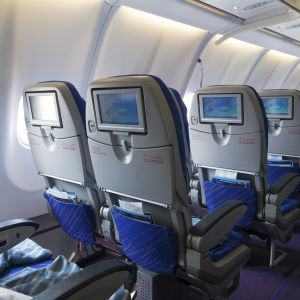According to Greek legend, Procrustes was a rogue blacksmith who had an iron bed that he would invite to travelers to use, except that if they were too short, he would stretch them until they fit it and if they were too long, he would amputate the offending limbs.
Well, over at American Airlines, the spirit of Procrustes is alive and well.
They’re planning to reward you for your business by putting you in even smaller seats than you’re now squeezed into. They’re going to lop two inches off the space you’re getting on their new Boeing 737 MAX airplanes.
In fairness, I must point out that Spirit Airlines already has customers on their aircraft squeezed into the smaller seats. Others will follow suit.
Unbelievably, American and some airlines are going to compound their hostility to their customers by making the toilets even smaller than they are now. Soon they may reduce service to a kind of communal bedpan; that way they could cram in more seats.
But that’s not all. The airlines are already discussing a sub-coach fare, where you’d get the tiny seat and the dolls-house toilet, and you wouldn’t get any space in the overhead bins and your flight wouldn’t qualify for frequent-flyer miles.
The plan here is to get you to upgrade to a slightly larger seat, allowing you to carry your bag on board. The wise will take that option because otherwise, it looks like you’ll be paying a fee for your small bag to go into the hold. Crafty.
All this is glorious fun for late-night comedians — none of whom would be caught dead in coach, by the way. They’re all up front, if a private plane isn’t available.
But there’s a big safety issue here which the airlines, in their desire to get more bodies jammed into the wretched space available, don’t talk about. If there were an accident — and there will be one because safe as airline travel is, there are always accidents — people will be stuck in their seats because the gangways will be too crowded. Crowding makes for chaos.
The worst scenario – and I’ve discussed this with aviation experts aplenty over many years — is what would happen in those precious moments, either after a very hard landing with a collapse of the gear or a collision on the ground, before fire breaks out? Precious seconds when people in panic in the rear of the plane will most likely be fighting each other to get to the escape routes. And, of course, there will be some fool trying to get his or her suitcase out of the overhead bin.
Hijacking goes back to the earliest days of airplanes, but ramped up in the 1960s with hijackings to Cuba, and then the Middle East got into the game.
Pilots, airlines and the government knew there was a simple way of frustrating this: harden the cockpits with locks and steel bars. The White House knew about the fix, as did the FAA: I raised it with the White House, and friends raised it with the FAA.
But the airlines said it would be too expensive, which is always the first line of argument from people who don’t want to do something; the existential fear of spending money.
After 9/11, the cockpits were hardened almost overnight. I asked a former White House science adviser why the fix couldn’t have been done earlier, when people in aviation had suggested it. He told me, “I should have pushed that one harder.” Indubitably.
The unconscionable crowding of airliners, like the hardening of cockpits, will have to wait until the aviation community, the FAA and the public realizes that not only is flying in coach on an airliner today a horrible experience, but it’s also potentially dangerous, very dangerous.

